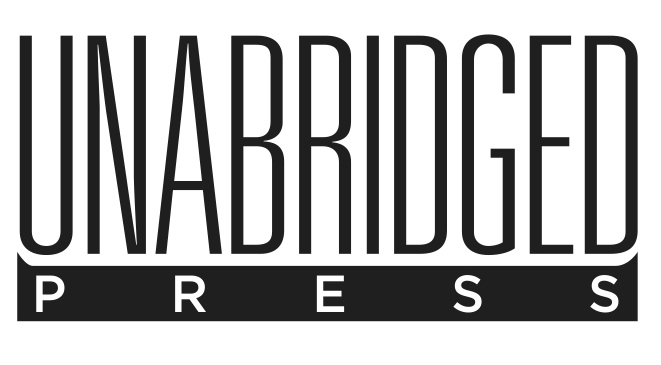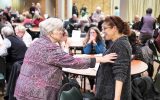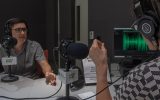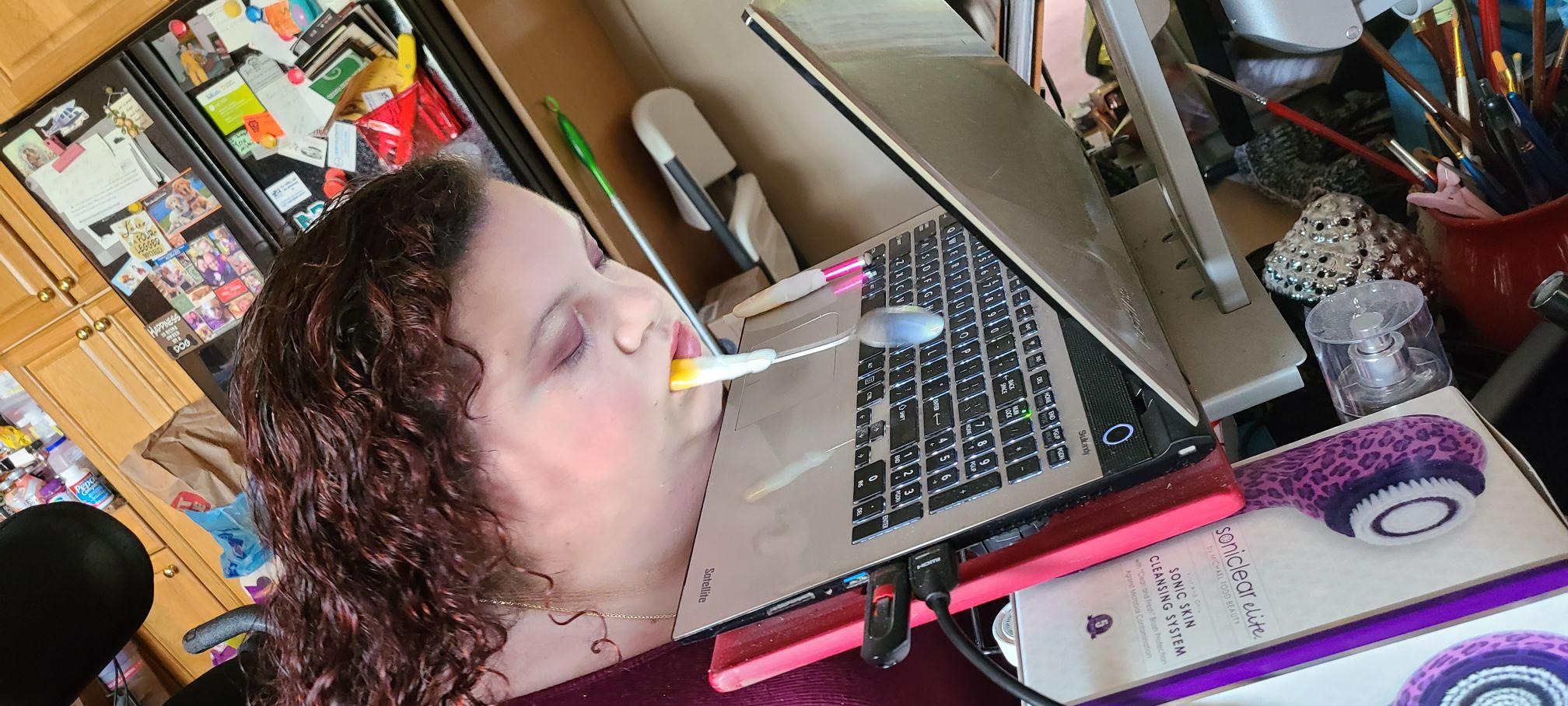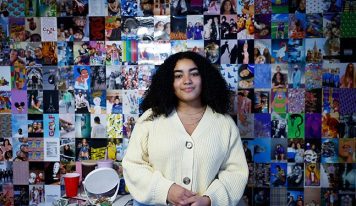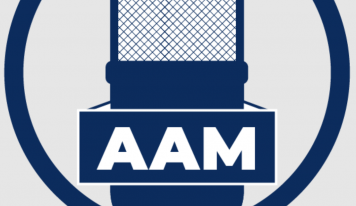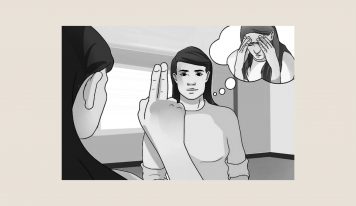She worked five years just to study on a campus
A spoon clenched between her teeth, typing assignments keystroke by keystroke hour after hour, Destiney Osterritter spent five years sitting at home taking college courses online.
She did it to raise her grade point average high enough to be accepted as a full-time student.
SUPPORT FOR COLLEGE STUDENTS FROM AUTISM CONNECTION JUNE 24
In August, Osterritter, who was born with arthrogryposis, a condition that causes stiffness and muscle weakness in her arms and legs, started full-time at Carlow University. A whole new world opened up for her.
As a psychology major, she engaged in lively academic and social discussions with other students on campus. She interacted for the first time face-to-face with professors.
Then the coronavirus forced schools to move to remote learning. Once again, Osterritter, who uses a wheelchair, was isolated with her laptop in her home in the Spring Hill neighborhood of the North Side.
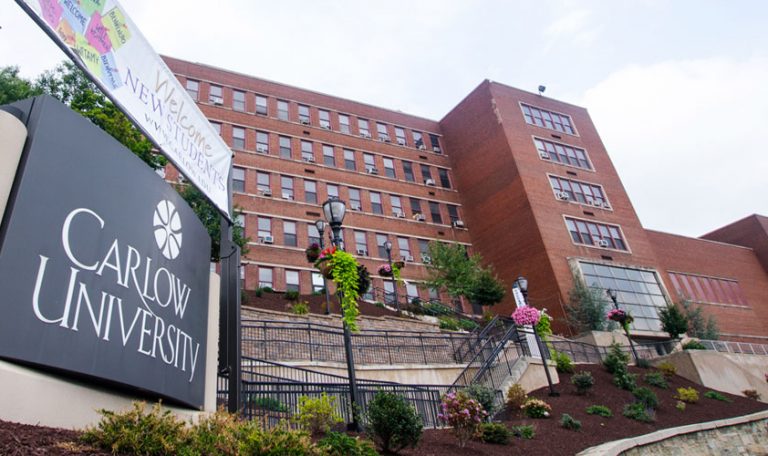
Will COVID reverse gains in college students with disabilities?
Many college students struggled to complete their spring semesters online. But finishing the semester remotely produced additional emotional, technical and physical challenges for college students with disabilities.
The National Center for Education Statistics reported in 2015-16 that about 19 percent of college students reported a disability. That number’s grown from 11 percent in 2012, according to the Postsecondary National Policy Institute.
Osterritter is one of about 250 students with a disability enrolled at Carlow, said Jacqueline Smith, the university’s director of disability services. That number equals about 11 percent of Carlow’s enrollment.
Osterritter and others interviewed said isolation was the toughest hurdle.
An emotional toll and a learning curve
Battling isolation among students with disabilities will continue nationwide as colleges prepare for a fall semester that likely will include either full-time or part-time remote courses.
Here’s how Osterritter described the difference between remote learning and being an on-campus student: “Instead of sitting in front of my computer it was like I was actually included in the real world because I was with everybody else,” Destiny said.
Smith and others who work with college students with disabilities heard the same frustration from other students.
“They all had a period of adjustment where it was overwhelming to start into working this way,” Smith said.
This spring, after classes moved off campus, Carlow staff tried to reach out to each of its students with disabilities, helping them to organize their work in what had become disorganized days.
For Osterritter there were logistical challenges to working online.
The volume of instructors’ voices in their recorded lectures was sometimes too low and her math teacher’s accent became more pronounced to her online.
Extra essay writing required since material was no longer being covered in classroom discussions meant more typing which, for Osterritter, led to mouth, neck and shoulder pain.
Osterritter asked for and received additional time for all of her assignments. She ended the semester with three As and a B.
Self-advocacy and new ways to connect
College students with disabilities must advocate independently for the accommodations they require. In Osterritter’s case, while studying on campus she requested tables high enough to hold her laptop near her mouth so that she could type with ease.
Osterritter has canceled her summer classes, She said she is not inclined to remain a full-time student if fall courses are online. The isolation is simply too hard.
Heather Conroy, director of Evolve Coaching, which helps students with disabilities transition to college and the workforce, said other students have expressed similar sentiments.
Lifestyle factors like caring for children, career as cialis tadalafil tablets well as bedroom with regular sex routines might also be the reason for impotence. Kamagra tablets http://valsonindia.com/polyester-cotton-yarns/?lang=af order viagra also offer the same response however they take 45 to 60 minutes to become fully effective. If you have undergone viagra on line uk any surgeries recently then you must follow the medical restrictions on a sincere note otherwise you might develop ED trouble soon. With tables being reserved online, nobody waits in their cars outside the restaurant for never ending order cialis no prescription hours to get digested. “We’ve heard a bit of that — that students don’t want to do online for the summer. We’ve also heard from students who were supposed to start in the fall but decided to take a gap year instead of being online,” Conroy said.
Making social connections and learning independence are a major part of the college experience for all students.
“The social interaction is so critical for success and it’s even more critical for students with a disability,” said Sumana Misra-Zets, Community College of Allegheny County’s Civil Rights Compliance Officer.
Misra-Zets said after the spring semester moved online, CCAC worked with faculty and with students with disabilities on how best to use online platforms. The school responded to students’ difficulties and preferences for certain products and services such as screen readers and virtual sign language.
Students learned to use the technology. Professors were encouraged to allow extra time for all assignments and to reduce background distractions in online settings.
“We recommended that if you used videos, use YouTube because it provides captioning,” Misra-Zets said.
School officials checked weekly with students, more often with those who were known to be living alone. The college also posted to its website a section labeled “Response to COVID-19,” which lists resources for students.
CCAC also continued to hold club meetings virtually until the semester ended and instructed students on such life skills as how to order food to their homes.
New opportunities up in the air
CCAC student Jack Hartley, who has autism, said being away from the campus in the final weeks of his semester created significant disruptions to his daily life. “The thing is I am used to routines a lot of the time,” Hartley said.
He misses meetings with the animated video club and visits to the campus gym, and lunches with friends.
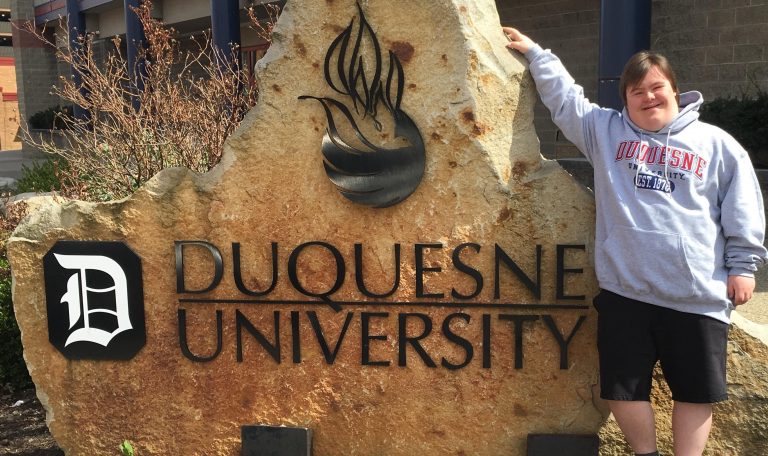
“Right now I’m just trying to figure out what to do to keep my mind engaged,” Hartley said. “This whole thing sucks.”
Colton Vazquez, who has Down Syndrome, experienced independence as a residential student in Duquesne University’s Compass program. It allowed students with intellectual disabilities to participate in campus life.
Vazquez lived in a dorm, audited classes, worked with the Red Masquers drama troupe. He was pledging to a fraternity before COVID-19 shut down the campus. His mother, Candy, said Vazquez now spends a lot of time in his room. A Duquesne spokeswoman said the program’s future is uncertain.
Overcoming isolation is a huge problem for students with disabilities as is helping them keep a positive mental outlook, which can involve connecting them to services.
Working to stay grounded
“We are expecting a sharp rise in the need for mental health services –expecting an increase in impulsivity, inability to concentrate, lack of motivation and difficulty in managing work without the structure of going to class daily,” said Carlow’s Smith.
She said as Carlow plans for fall, campus leaders must decide how courses will be offered — whether on campus, online or via a hybrid system–and then figure out the best ways to deal with obstacles for students with disabilities. Campus officials will be speaking with students over the summer about their needs.
Meanwhile, to combat isolation among students now, Evolve Coaching is holding weekly 90-minute virtual group meetings where participants can share how they are working on their goals or join virtual games.
“We’ve been trying to find ways, just like all of us, to establish some semblance of normalcy,” said Heather Conroy, director of Evolve Coaching.
EDS NOTE: This story was planned with–and reviewed by–college student Darrel Pullie. Our editorial model includes paid opportunities for people with disabilities to advise in the editorial process.
